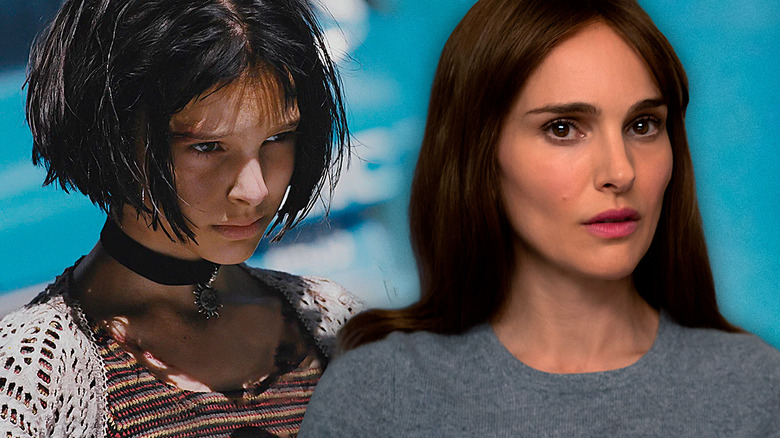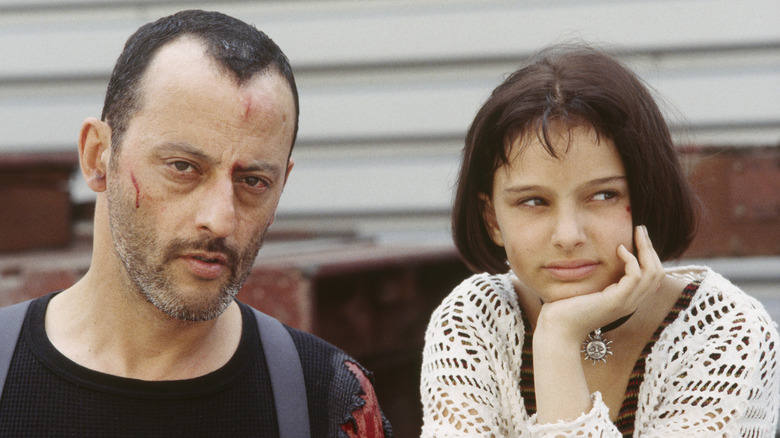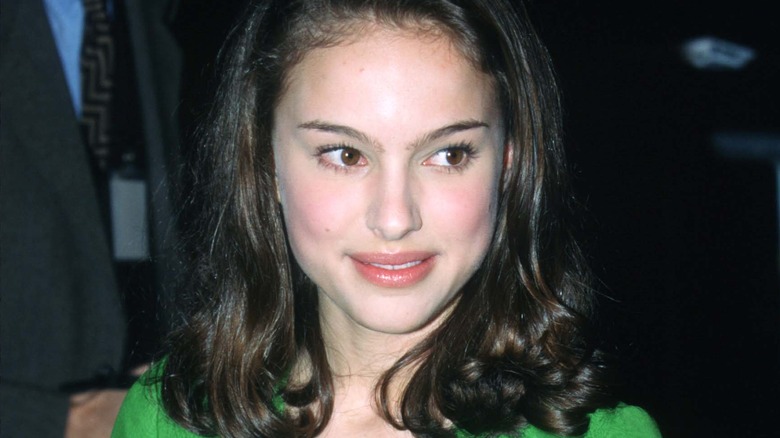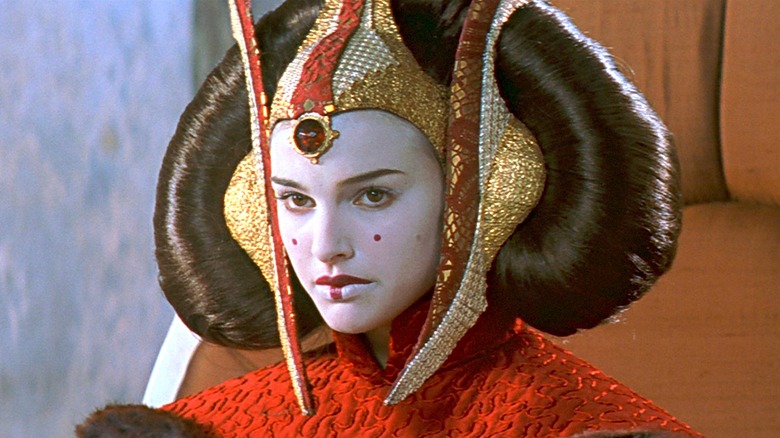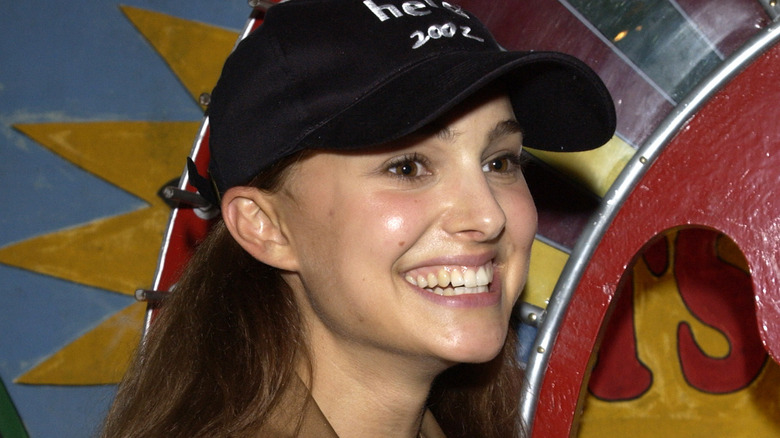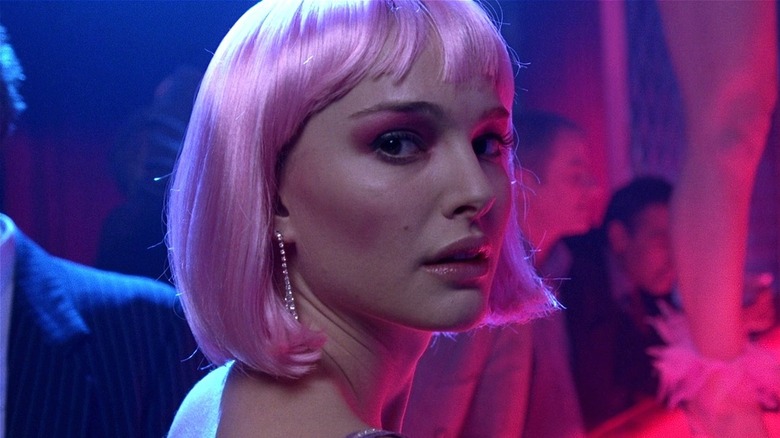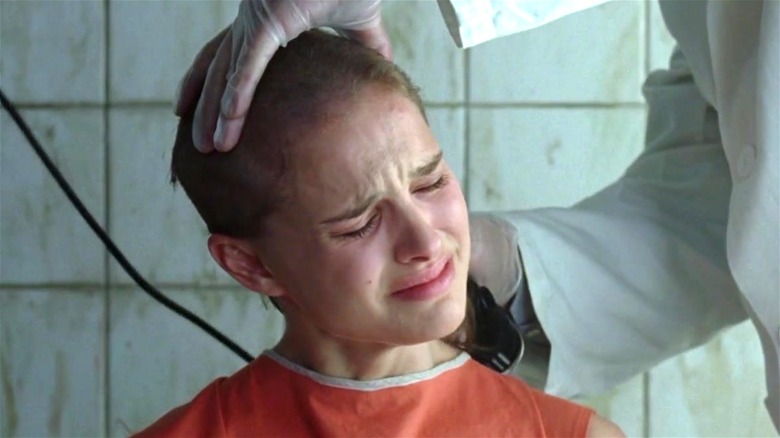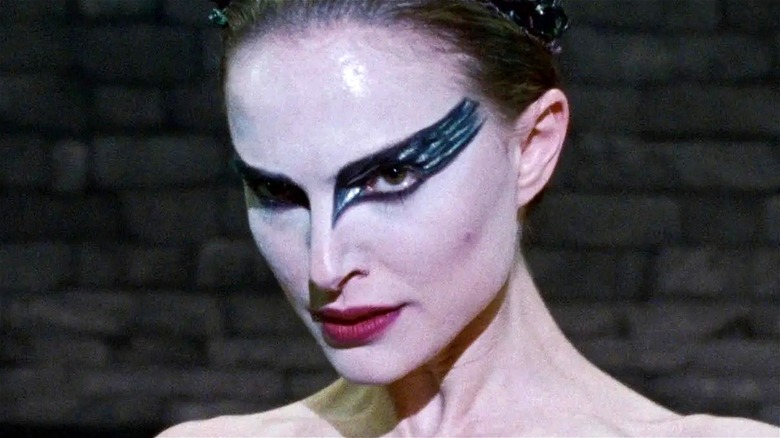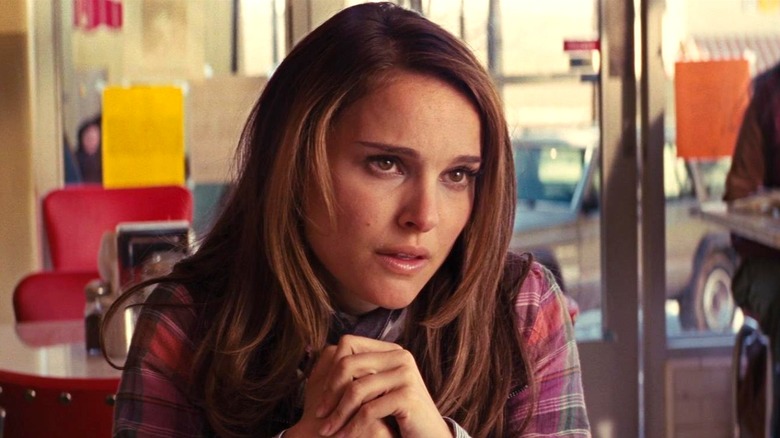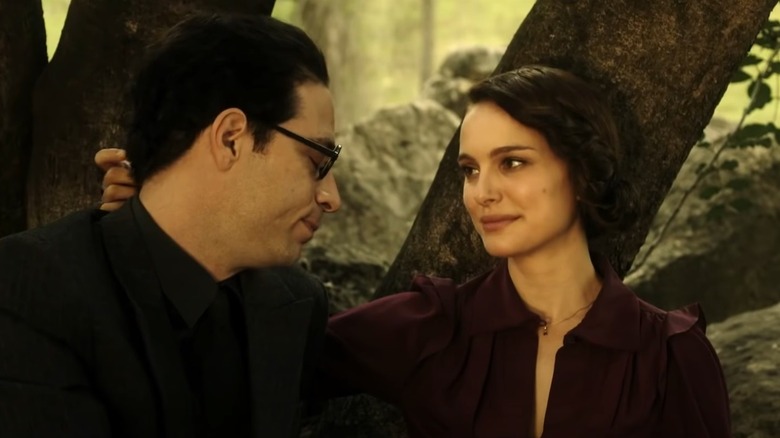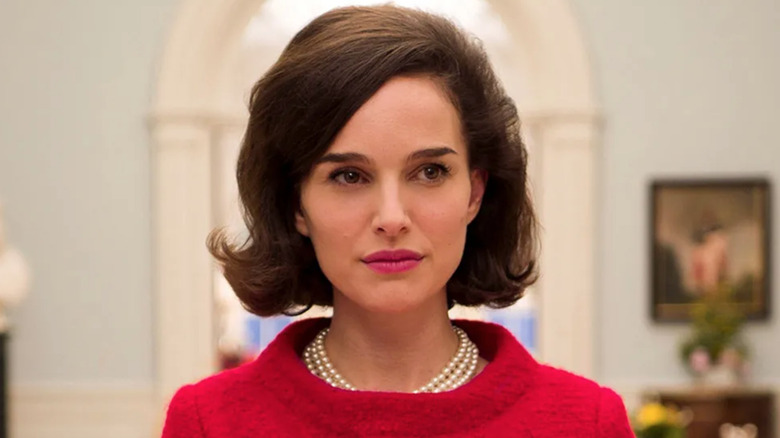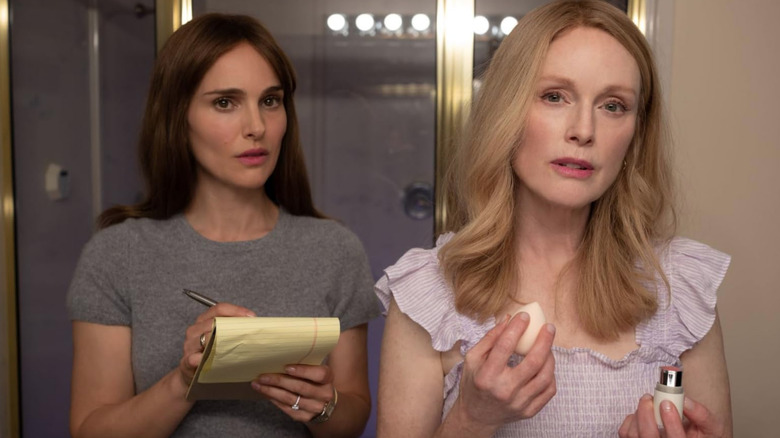Natalie Portman's Transformation From Léon: The Professional To May December
Natalie Portman was just 12 years old when she made her movie debut as Mathilda in Luc Besson's "Léon: The Professional," but she refused to fade away like so many child actors before her, instead going on to enjoy a glittering career in Hollywood. Right off the bat, she captivated audiences with her impressive range and maturity as Mathilda. She followed it up with a role in Michael Mann's crime thriller "Heat," and she continued to grace the big screen with a wide range of roles after coming of age, from Padmé Amidala in the Star Wars prequel trilogy to the mysterious stripper Alice in the romantic drama "Closer."
In addition to acting, Portman has dedicated time to higher education, attending the prestigious Harvard University. She has also harnessed her fame and fortune to champion various noble causes as an activist and philanthropist, raising awareness and funds for animal rights, poverty alleviation, youth empowerment, combating sexual abuse, and anti-racism initiatives. With a work ethic as strong as hers, Portman's career evolution is unlikely to slow down any time soon. Let's take a look at her transformation from "Léon: The Professional" to her latest hit, Netflix's "May December."
Léon: The Professional was a controversial debut
12-year-old Natalie Portman captured the world's attention with a standout performance alongside seasoned actors Jean Reno and Gary Oldman in 1994's "Léon: The Professional." How did this unknown child star book such a big film debut? After being scouted by a Revlon rep at a pizza restaurant, Portman hired an acting agent. Her very first job was as an understudy for the 1992 off-Broadway production "Ruthless!," taking over from an equally unknown Britney Spears.
When it came time to audition for "Léon: The Professional," Portman (who was just 11 years old when she tried out) left a lasting impression despite her limited experience. She secured the part of Mathilda, a troubled child wise beyond her years seeking revenge on the corrupt DEA agents that brutally murdered her family. She forms an unlikely bond with the emotionally detached hitman Léon (Reno) as the two navigate a world of violence and corruption. Portman's performance was met with critical acclaim, kicking off the young actor's career with a bang.
However, playing such a mature role at a young age came with its drawbacks. Portman's parents had several conditions for the filmmakers, including the removal of a shower scene, but they still came in for criticism for letting her do the movie. Speaking to the Los Angeles Times about the film back in 1996, Portman said that there's "nothing disgusting in the way it's handled," though she's changed her tune since then. "It gave me my career, but it is definitely, when you watch it now, it definitely has some cringey, to say the least, aspects to it," she told The Hollywood Reporter in 2023.
She made smart choices after Léon: The Professional
After her breakout turn in "Léon: The Professional," Natalie Portman began receiving offers for more movie roles. However, because of the discourse that followed her debut, she was now cautious about parts that skewed sexual. Portman was well aware that she was in danger of being typecast as a precocious adolescent — she was even offered the lead role in Adrian Lyne's "Lolita," an adaptation of Vladimir Nabokov's controversial tale of a professor who falls for an underage girl. "I met with the director but I immediately told him there's no way I'm gonna do this movie," she told the Los Angeles Times. "He told me they'd use body doubles but I said people will still think it's me, so no thank you."
Around this time, Portman was cast in Baz Luhrmann's "Romeo + Juliet" opposite Leonardo DiCaprio, but she had to give up the role because executives deemed her too young to be paired with her older co-star. "She was 14. And when you see Leo in the flesh, he's a tall, young man and you just realized, she was too young," Luhrmann said to The New York Times about the situation. "Natalie was amazing in the footage, but it was too much of a burden for her at that age." Portman was quick to put the rejection behind her, appearing in three films in quick succession: Woody Allen's musical "Everyone Says I Love You," Ted Demme's romantic dramedy "Beautiful Girls," and Tim Burton's science fiction comedy "Mars Attacks!"
Portman played Anne Frank on Broadway
As the '90s marched on, Natalie Portman found herself wanting to return to her theatrical origins. She won the role of Anne Frank in a Broadway revival of "The Diary of Anne Frank," which ran at the Music Box Theatre from December 1997 to June 1998. The days were long for the young star, who had to juggle her budding career with her education. She broke down a typical weekday in a piece for Seventeen magazine, revealing that she spent her morning at school before being driven to rehearsals. She would spend her lunch break being tutored, and then more tutoring came when rehearsals were finished. She would still be learning until after 8 pm some nights, and there was no letting up at weekends, either.
Despite the exhausting schedule, Portman was adamant that the sacrifice was worthwhile to portray a beloved historical figure with whom she felt a deep connection. "Anne's literal entrapment and terror figuratively describe the claustrophobia and fears of teenage experience," she wrote in another op-ed for Time magazine. "Personally, she let me know that I was not weird when I was not getting along with adults, or was infatuated with a boy I knew I didn't really like." Portman's personal connection went even deeper, rooted in her family's direct experiences with the Holocaust – her great-grandparents and several other family members were killed. As one can imagine, the play had a profound impact on the emerging actor.
The pros and cons of being in Star Wars
Natalie Portman returned to the big screen with much fanfare when she won the sought-after part of Padmé Amidala — the 14-year-old Queen of Naboo — in the Star Wars prequel trilogy. Despite having no prior knowledge of the franchise, Portman knew it was a chance to show the world what she could do. "I was very honored and excited to be presented with such a great opportunity, but I really wasn't aware of how big a deal Star Wars was," she told CNN. "When I saw the films, I really liked them, but I still didn't really understand how many [people] were passionate fans."
"Star Wars: Episode I – The Phantom Menace" premiered in the spring of 1999, the same year as Portman's high school graduation — she actually had to miss the premiere of the film in order to study. The highly-anticipated picture ended up grossing more than $1 billion at the worldwide box office after its 3D re-release. However, while it was a commercial success, many fans of the franchise reacted negatively to it, and Portman's career suffered as a result. "Everyone thought I was a horrible actress," she told New York Magazine. "I was in the biggest-grossing movie of the decade, and no director wanted to work with me."
In 2001, Portman returned to the stage for an adaptation of Anton Chekhov's "The Seagull," directed by Mike Nichols. Portman credits Nichols with helping her get her career back on track by writing a letter to director Anthony Minghella, urging him to put Portman in his film "Cold Mountain." It worked, and Portman's performance in the Civil War drama helped her regain recognition in the industry.
Putting acting on hold for Harvard
Education has always been a priority for Natalie Portman. Even in her earliest interviews, she made a point of clearing up any misconceptions about her life priorities. "I definitely intend to go to college, and I don't plan to major in drama," she told the Los Angeles Times in 1996. Shortly after the release of "Star Wars: Episode I – The Phantom Menace," Portman enrolled at Harvard University to pursue her bachelor's degree. She spent the next three years dedicating herself to her studies and put acting on the back burner for the most part. "I'm going to college. I don't care if it ruins my career. I'd rather be smart than a movie star," she told The Guardian.
Portman wisely used her summer breaks to keep one foot in the Hollywood door while studying. She reprised her Star Wars role in 2002's "Star Wars: Episode II – Attack of the Clones," and she would play Padmé for a third and final time in 2005's "Star Wars: Episode III – Revenge of the Sith," though by this point she had already graduated — the actor left Harvard with a degree in psychology in 2003. "It was very clear when she was a student that she is a very determined person and capable of focused effort over a sustained period," former Harvard psychology professor Stephen M. Kosslyn said of Portman (via The Washington Post).
Transitioning to grown-up roles with Closer
After working with Mike Nichols on "The Seagull," Natalie Portman felt as though the director had taken her under his wing. When the chance emerged to work alongside her new mentor in his 2004 romantic drama "Closer," based on the play of the same name, she eagerly seized the opportunity. By this point, Portman had successfully transitioned into a fully realized adult actor and she felt the time was right for a more risqué role. "After Léon came out — a film I'm so proud of — it was very strange being 12 years old and having grown men writing me letters. So I've really shied away from that stuff," she told The Guardian at the time. "Now I am more willing to put myself out there in different ways. I'm at a point where it's like, 'Who cares?' I'm a mature person. I can handle it."
Portman plays Alice, a mysterious American stripper who moves to London and becomes involved in a romantic entanglement with three other characters, played by A-list stars Julia Roberts, Jude Law, and Clive Owen. Despite being the youngest and most inexperienced cast member, Portman more than held her own. "Owen and Portman give excellent, committed performances, leaving Law and Roberts in the shade," said Time Out in a review, while the BBC called Portman's turn "especially fearless." Her work in the film resulted in her first Academy Award nomination for best supporting actress.
Portman shaved her head for V for Vendetta
Natalie Portman took yet another daring leap when she agreed to transform her appearance for the very first time in her career, taking on a role in the dystopian action film "V for Vendetta." She plays Evey, a young woman living in a fictional, near-future version of England run by an authoritarian political party called Norsefire. The population is persecuted based on everything from sexuality to religious beliefs. Evey becomes involved with a masked freedom fighter known as V (Hugo Weaving) and together they become a symbol of resistance. In one famous scene, Portman's character has her head shaved.
Not only was this scene a profound shift for the character, but it also ended up having an impact on Portman's personal life. "It's very rare to be experiencing something in real life at the same time as your character, so that was a pretty unusual experience," she said in a Moviefone conversation with co-star Weaving. She expanded on her experience in a Vanity Fair interview, explaining how she'd become more aware of gender expectations and how people perceive and treat a person based on something as simple as a haircut. Nevertheless, this wouldn't be the last time Portman would push boundaries for a role.
She brought her A-game for Black Swan
In preparation for her role in the 2010 psychological thriller "Black Swan," Natalie Portman embarked on the most rigorous training regimen of her entire career, making even the act of shaving her head seem like a trivial challenge. Director Darren Aronofsky first approached Portman about the movie in 2000, way before the script was written. When the time eventually came to move forward with the project, Portman "took the part and ran with it," Aronofsky told MTV. "I don't know if when I was working with the writers we were consciously channeling Natalie or Natalie somehow transformed herself to the part, but they grew together."
In order to get into the physical shape of professional ballerinas, Portman and co-star Mila Kunis began their training six months before shooting. The regimen included a mix of ballet, cross-training, and swimming for five to eight hours a day. In addition to proving her dedication to her craft, Portman further subverted expectations with an intimate scene involving her and Kunis' characters. For Portman, this was just another way of reshaping the public's perception of her. In the end, her hard work paid off. Her performance garnered critical acclaim and resulted in her scooping the Oscar for best actress.
Portman joined the Marvel Cinematic Universe
In 2011, Natalie Portman joined the Marvel Cinematic Universe as Jane Foster, a brilliant astrophysicist and Thor's romantic interest. Portman explained her reasoning behind signing up for "Thor" during a press junket (via E! News), explaining how she thought the idea of Kenneth Branagh directing a superhero flick was intriguing. The film was a tremendous commercial success, and in 2013, Portman reprised her role in the sequel "Thor: The Dark World." The second film outperformed the first one at the global box office by nearly $200 million, establishing Portman as one of Forbes' highest-earning celebrities in 2014. However, she told The Wall Street Journal she was "done" with Marvel in 2016, and when she didn't appear in the third film, "Thor: Ragnarok," it looked like her time as Jane was done.
This, of course, changed in 2022 when director Taika Waititi convinced Portman to return for "Thor: Love and Thunder" as a reimagined Mighty Thor version of Jane Forster. The role also presented a new challenge for Portman, who had to train for 10 months to rebuild her physique. In contrast to her weight loss for "Black Swan," this time, she needed to focus on gaining and building as much muscle as possible. "I feel like it's the phase of my career where I'm really trying to just impress my kids," she told Variety. "My 5-year-old and my 10-year-old were so enthralled by this process, getting to visit the set and see me dressed up in a cape. It made it really cool."
Directing her own movie wasn't easy
Between the time spent on scriptwriting, securing funding, starting a family, and balancing her acting career, Natalie Portman's directorial feature debut, "A Tale of Love and Darkness," took nearly a decade to bring to fruition. Upon reading the memoir of the same name by Israeli author Amos Oz, Portman knew right away that she wanted to be the one to bring the story to the screen. "[It was] something I was passionate about, and curious about, and interested in, in a way that could be sustainable for as long as it takes to make a film — which is years and years," she told NPR.
In an interview with W Magazine, Portman candidly shared that being a director "didn't come naturally" to her, but she gleaned valuable insights from esteemed collaborators like Darren Aronofsky, Mike Nichols, Anthony Minghella, and Terrence Malick. Additionally, Portman had the added task of starring in the film, which required her to become more proficient in the Hebrew language. The film screened at the 2015 Cannes Film Festival and received generally favorable reviews from critics: It has a respectable 72% critic rating on Rotten Tomatoes.
Playing Jackie Kennedy gave Portman a newfound respect for the former First Lady
In 2016, Natalie Portman portrayed former First Lady Jacqueline Kennedy in the biopic "Jackie." For Portman, the pressure was on. "She's so well-known in terms of what she looks like and what she sounds like and how she moves, so to get that is definitely daunting," she told Entertainment Weekly. To accurately embody the character, Portman researched extensively by watching every video, reading every book, and listening to every audio tape she could get her hands on. By the end, she had gained a newfound respect for the icon.
Portman received widespread praise for her performance, which was hailed as one of the best of her career to date. "Natalie Portman's performance is as good as everyone says," said the Sydney Morning Herald, while the St. Louis Post-Dispatch said that "Portman is simply brilliant, getting to the essence of Jackie without resorting to a mere impersonation." Portman earned her second Academy Award nomination for best actress for her turn in the film, but the honor ended up going to Emma Stone for her performance in "La La Land."
Portman portrays an actor in May December
After working as a producer on numerous projects, Natalie Portman decided to start her own production company with her friend Sophie Mas. When the latter left her job at RT Features in 2019, Portman reached out and suggested they team up. They called their company MountainA, which is "named for the Sisyphus myth, their shared affinity for the mountains, and the first letter of all their children's names," The Hollywood Reporter confirms. They immediately signed a multi-year first-look agreement with Apple TV+ for their small screen projects, but the distribution rights for MountainA's first feature film, the 2023 dramedy "May December," were bought by Netflix after the movie impressed at the Cannes Film Festival.
In addition to producing, Portman also plays the character Elizabeth, an actor who immerses herself in the intimate study of the controversial woman (Julianne Moore) she's slated to portray in a film. "It was really fun to get to explore being an actress, and what it means to depict a real-life story," Portman told Vogue. "It gets you thinking about how you might influence something — it's a question a documentarian or journalist might also ask — and how you affect a story by your portrayal of it." The film was met with a glowing response from critics: At the time of this writing, it's Portman's highest-rated feature film on Rotten Tomatoes with a score of 91%.
